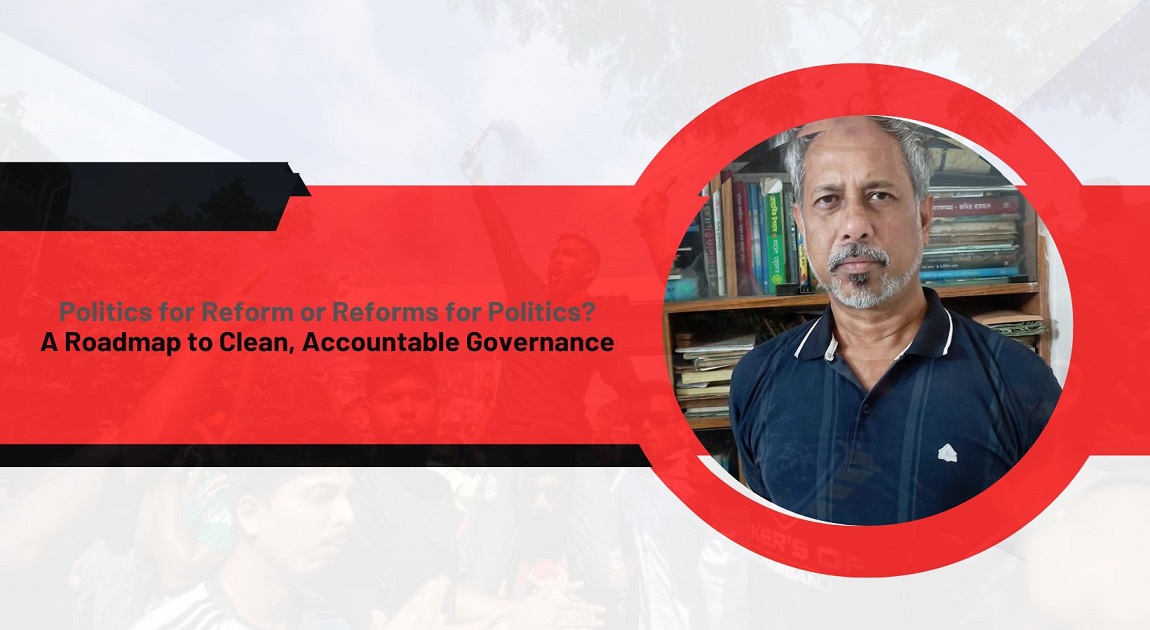There is no doubt that political reform is essential for our nation to free itself from corruption, malpractice, and public disillusionment. The need to reform political culture and practices has become a demand of the time. But real change cannot come overnight—it requires clarity, commitment, and a clear roadmap.
Political reform must be focused on the people. It should be driven by a desire to build a transparent, accountable, and democratic system that truly represents public interest. The core questions remain: Who is politics for? Why should someone engage in it? And what do they gain by serving?
To clean up politics, we must start by transforming its financial backbone. Political parties need a legal, transparent, and sustainable model for earning and spending money.
Currently, many parties rely on opaque income sources, creating room for corruption and defamation. If politicians are expected to dedicate themselves full-time to party work, their basic livelihood must be guaranteed by the party itself. Without this, corruption becomes inevitable.
A politician without an honest income source is at risk of turning to illegal methods—extortion, favoritism, or abuse of power. Therefore, treating politics as a profession is not only fair but necessary.
If a party expects full-time commitment from its workers and leaders, then it must provide them with fair compensation. A structured salary system, based on roles and responsibilities, can help attract ethical, dedicated professionals to political life.
This model will help restore accountability. Politicians will serve the people not as benefactors but as professionals—earning their keep through service and responsibility. The divide between political elites and ordinary citizens will begin to narrow.
Professionalism will ensure that political leaders realize they are not above the people—they are part of the people. This will also allow the public to ask: “If our money funds political work, are we getting results in return?”
Political parties must reduce unnecessary expenses and focus only on essential operations. There should be clear accounting of income and expenditure—who is paying what, for what reason, and who is spending.
Parties must abandon illegal collections and forced subscriptions. Only legitimate member subscriptions and donations through legal channels should be accepted. If additional funding is needed, parties can explore ethical income-generating ventures—such as renting property or offering public services.
An effective way to manage political funding is through state oversight. The Election Commission can allocate operational funds to registered political parties based on their electoral performance, size, and public engagement.
This model is practiced in many democracies. The Commission will maintain transparency and set clear rules. Business organizations can donate to the Commission—not to political parties directly—ensuring neutrality and avoiding undue influence.
Parties will submit budgets, activity reports, and financial plans. The Commission, after verifying, will allocate funds proportionally. This system will promote fairness, discourage black money, and reduce the influence of wealthy individuals or business groups.
No system will succeed unless there is genuine willingness to change. Many problems lie not in the lack of rules, but in the failure to enforce them. Reform requires an internal shift in mindset. Political parties must act not just as power brokers but as service organizations.
Democratic practices must return to the party’s core. Real leadership must be allowed to rise—not based on wealth or muscle, but on vision, integrity, and public service.
If political parties truly want to reform, they must restructure themselves: fewer leaders, more activists; fewer businessmen, more public servants. The aim should be fewer but stronger parties that uphold democratic values and reject corruption.
Ultimately, all political reform must serve one purpose: to restore faith in democracy. Reform is not for the sake of reform—it is to ensure justice, equality, and public dignity.
Parties often claim to act in the people’s interest. Yet the people are rarely consulted or prioritized beyond elections. Reform will only be meaningful when it centers on the needs, voices, and aspirations of ordinary citizens.
The path is not easy, but it is necessary. If political parties, the government, and the people align in will and vision, a transparent, accountable political culture is possible.
Let politics be a true profession—of service, honesty, and hope.
The author is a Bangladeshi senior journalist and writer.
The views expressed in this article are solely those of the author and do not necessarily reflect the editorial stance of The Report.live.





-20251228011000.webp)




-20260225072312.webp)











-20260224075258.webp)













-20260219054530.webp)
-20260218060047.jpeg)
